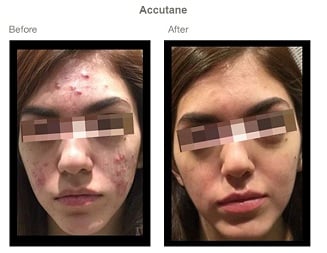
If you’ve struggled to get and keep your acne under control and have had very little success, you and your dermatologist might consider the value of Accutane. Chronic, long-term acne can devastate your self-confidence. This condition, especially cystic acne, also carries a significant risk of scarring. We understand the impact that acne can have on your skin and on your life, and we’re here to help you face this issue successfully.
At Stone Oak Dermatology, Dr. Linda J. Banta will tailor her treatment recommendation to your skin, your type of acne, and your previous treatment successes or failures. Contact our San Antonio office today at 210-494-0504 to take the next step toward clearer, healthier skin!
What is Accutane?
Isotretinoin, most commonly known by the former brand name Accutane, is a powerful prescription medication that has been developed as a treatment for severe, resistant cystic or nodule acne. These types of acne are often influenced by the overproduction of sebum, resulting in extremely clogged pores. Isotretinoin is a retinoid, just like Retin-A. Unlike that topical derivative of vitamin A, isotretinoin is taken orally.
The purpose of isotretinoin is to decrease the production of sebum (oil) and simultaneously reduce the shedding of skin cells, allowing the body to recover from chronic acne.
Who is an Ideal Candidate for Accutane Treatment?
You may be a good candidate for prescription isotretinoin if you have tried other treatments for chronic acne but have not achieved good results. Before prescribing this drug, your dermatologist may recommend applying benzoyl peroxide or prescription clindamycin to your skin. Oral medications that are typically tried before isotretinoin include minocycline and tetracycline. If these approaches have not worked to reduce or resolve your acne, it may be time to discuss a more robust medication like isotretinoin.

It is important to understand how isotretinoin works and that this drug is prescribed with strict guidelines. You cannot take isotretinoin if you are pregnant or may become pregnant in the near future. Before taking this drug, you must agree to using two forms of birth control, starting one month before administration begins and continuing for one month after you stop treatment. You also must have two negative pregnancy tests before beginning your treatment regimen.
What is Accutane Treatment Like?
When you are prescribed isotretinoin, it is essential that you take your medication exactly as prescribed. Do not crush or chew your pills, swallow them whole. Generally, pharmacists advise taking the drug with a meal and with a full glass of water. The food helps to expedite the absorption of the drug into the bloodstream. Also, when you take your medication, avoid lying down for at least 10 minutes.
You may experience some side effects from isotretinoin. Most are mild and easily managed. Some need to be reported to your doctor. When taking this acne medication, you may notice:
- Dry, cracked skin or lips
- Dry eyes (gritty, irritated eyes)
- Photosensitivity (always wear sunscreen)
- Peeling skin on your palms or soles of your feet
- Dry nasal passages, possibly resulting in bleeding
- Thinning hair (this resolves when treatment stops)
To manage these symptoms, stay well hydrated and use an emollient body cream or body oil. Avoid hot showers and other factors that may dehydrate your skin. You may apply oil or a moistening nasal spray to your nose to lessen the effects of dryness. In addition to wearing sunscreen, it is also beneficial to wear sun-protective clothing and a wide-brimmed hat.
Side effects for which you should contact our office include:
- Difficulty swallowing
- Joint, muscle, or back pain
- Headaches
- Abdominal pain
- Chest pain
- Seizures
- Mood changes
Recovery and Aftercare
There is no recovery period needed after you begin taking isotretinoin. However, there are ways in which you may care for yourself during your course of treatment. In addition to the suggestions your doctor makes for avoiding dry skin, eyes, and nasal passages, your self-care should also include paying attention to any unexplained mood changes or thoughts of suicide.
The risk of suicidal thoughts is a concern that many people have about taking isotretinoin. There are two things that you should know. One is that mood changes and suicidal thoughts occur in less than one percent of patients taking this drug. The other is that research has been inconclusive in associating those changes with isotretinoin. The vast majority of patients who have treated their acne using isotretinoin have done so without complication, physical or emotional.
How Soon After Treatment Begins Will I See Results?
It can take a few months for the results of isotretinoin to occur. Initially, there is a slight chance that acne can look worse. If this happens, contact our office to see how we can help! We understand that, when you’ve tried so many acne treatments and not gotten the results you deserve, it can be difficult to have more patience. According to studies, the proper use of isotretinoin can reduce acne by approximately 80 percent.
Schedule your Consultation
You deserve to feel at home in your skin. To learn more about the drug behind Accutane, contact our San Antonio office at 210-494-0504 and schedule your consultation with Dr. Banta.

